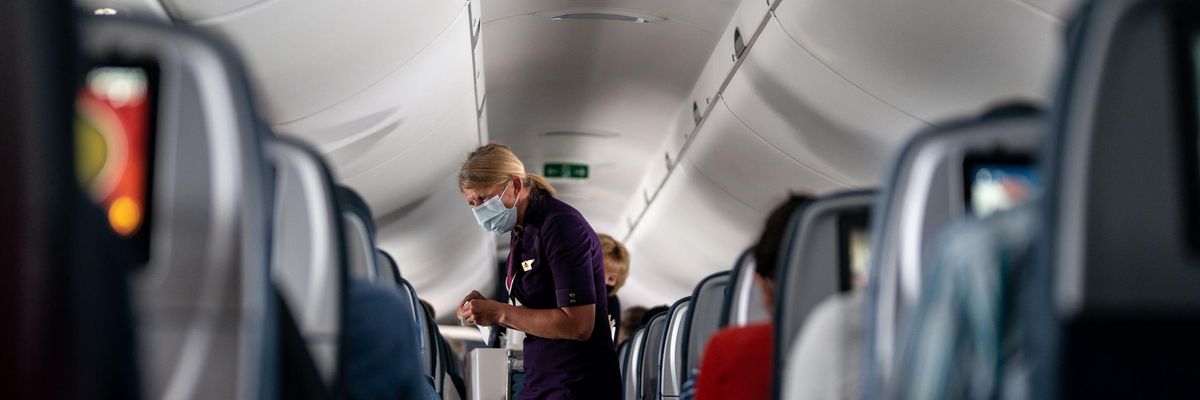Workers' rights advocates accused the Centers for Disease Control and Prevention of putting business interests ahead of public health Tuesday after the agency released new guidelines for asymptomatic Americans with Covid-19, while experts expressed concern that the guidance will result in confusion and more transmission of the disease.
The CDC announced late Monday that instead of isolating at home for 10 days, people who contract the coronavirus will be advised to isolate for five days immediately after testing positive. If the person is asymptomatic after five days, they may return to work, school, and other activities but should wear a mask everywhere, including at home if they live with others, for five more days.
"We do SO much just to find people who are positive in [the] first place. When we do identify them, we should do everything possible to keep them from spreading."
People who still exhibit symptoms after five days of isolating should continue to stay home until they are asymptomatic, the CDC said.
The agency said the guidance was revised because scientists now understand people with Covid-19 to be most contagious in the two days prior to showing symptoms and for three days afterward.
CDC director Dr. Rochelle Walensky also said concerns about economic activity provoked the new guidelines, as the fast-spreading Omicron variant overwhelms airlines, hospitals, and other businesses.
Sick crew members forced the cancellation of thousands of flights on Christmas Eve and Christmas Day, and the spread of the variant is "significantly diminishing" the healthcare workforce at hospitals across the country, according to the American Public Health Association.
"We want to make sure there is a mechanism by which we can safely continue to keep society functioning while following the science," Walensky told the Associated Press.
As Common Dreams reported Sunday, the CDC's amended guidance for healthcare workers--who as of last week are advised to stay home for seven days instead of 10 if they are asymptomatic and test negative--alarmed the nation's largest nurses' union, which said the guidelines were changed in the interest of hospitals' "business operations, revenues, and profits."
The CDC's new guidelines for the larger public come after officials at Delta Air Lines and JetBlue Airways wrote to the agency asking them to consider shortening the advised isolation period for people with Covid-19.
Sara Nelson, international president of the Association of Flight Attendants, acknowledged that the CDC provided a medical explanation for the new guidance, but emphasized that "the fact that it aligns with the number of days pushed by corporate America is less than reassuring" and warned that businesses may use the guidelines to pressure employees out of isolation before they are ready to return to work.
"If any business pressures a worker to return to work before they feel better we will make clear it is an unsafe work environment, which will cause a much greater disruption than any 'staffing shortages,'" Nelson said in a statement. "We cannot allow pandemic fatigue to lead to decisions that extend the life of the pandemic or put policies on the backs of workers."
Dr. Megan Ranney, an emergency physician at Brown University, also expressed concern that the new guidelines "will too easily move to 'go back to work when you have symptoms'" and that many people who come out of isolation after just five days will not wear face masks after the isolation period.
Dr. Aaaron Glatt, a spokesperson for the Infectious Diseases Society of America, pointed out that the shortened isolation timeframe will make it more likely that people return to normal activities when they are still infectious.
"If you decrease it to five days, you're still going to have a small but significant number of people who are contagious," Glatt told the AP.
Some observers also urged the CDC to clarify the guidance, as the agency's website suggested people can come out of isolation if they are asymptomatic or if their "symptoms are resolving after five days."
While calling the new guidance "reasonable" and noting that the shorter isolation period could push people to get tested who otherwise would not have, Harvard Medical School professor Dr. Ashish Jha said the CDC should include more precautions to help prevent transmission as people come out of isolation.
Epidemiologist Dr. Michael Mina noted that he has previously recommended a shorter isolation period to the CDC, but pointed out that recommendation "was always with a negative test."
Pushing people to return to normal activities without a negative test is "reckless," Mina tweeted.
In the U.K., epidemiologist Dr. Eric Feigl-Ding pointed out, two negative tests are required before people can exit isolation.
"But somehow a five-day exit with zero negative test is okay in [the U.S.]?" he said. "American exceptionalism does not apply to a pandemic virus."
With the highly transmissible Omicron variant, Mina said, "Someone KNOWN to be positive for five days is, in my view, still one of the highest risk individuals in society for onward spread."
"We do SO much just to find people who are positive in [the] first place," he added. "When we do identify them, we should do everything possible to keep them from spreading."
